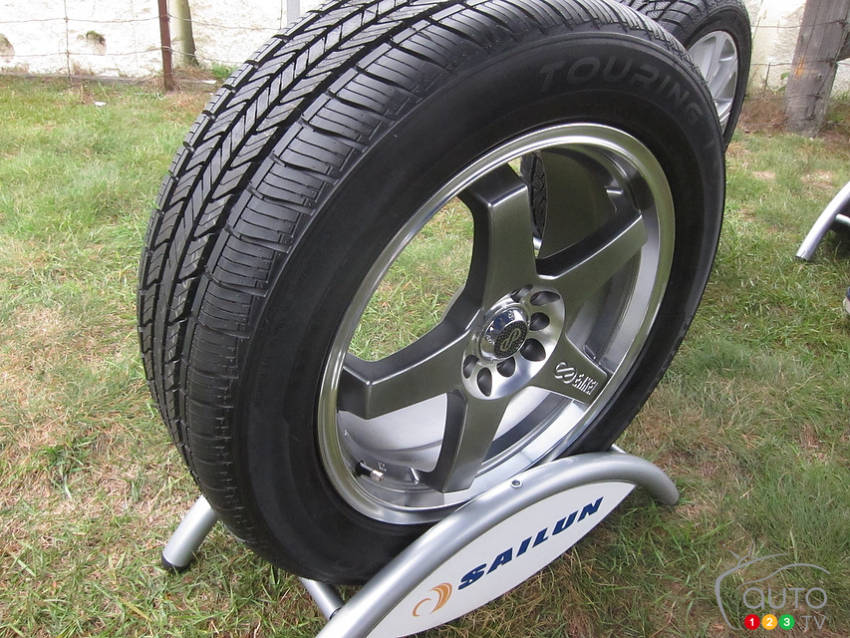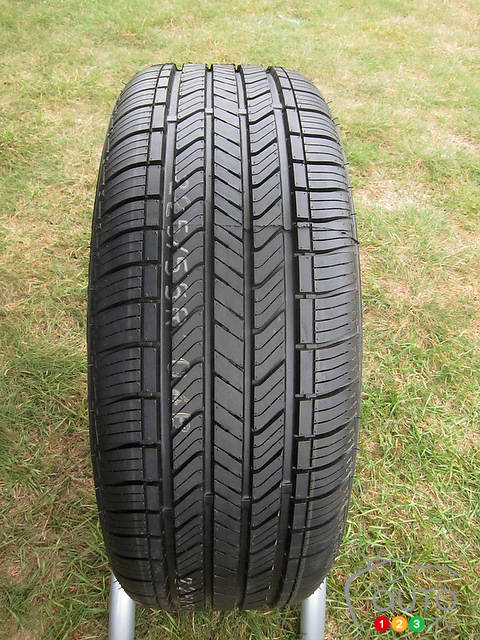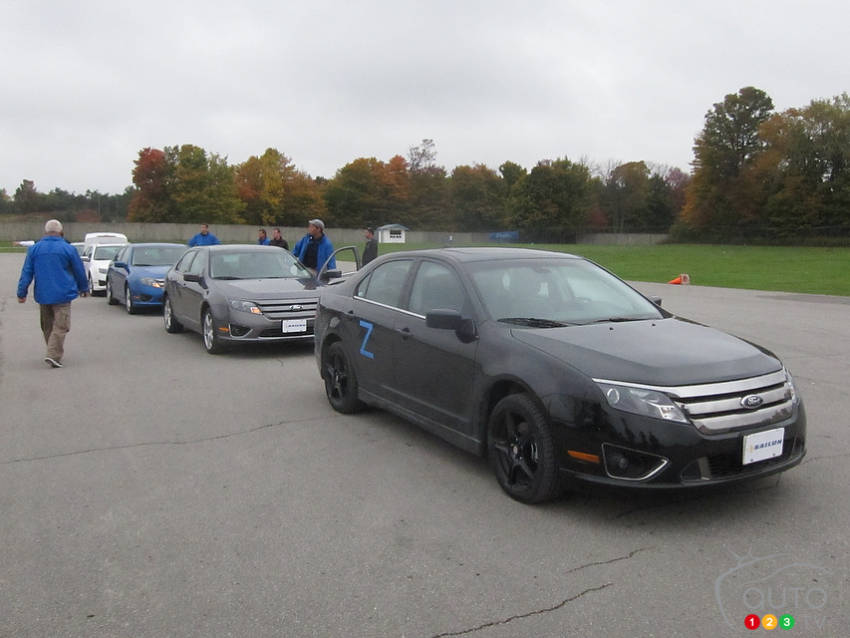BOWMANVILLE, ON – If you've never heard of Sailun Tires, you're not alone.
In fact, a survey of a group of automotive media gathered at Mosport's Driver Development Track showed only a marginal awareness of the Chinese brand – and that's among industry professionals.
But the Dynamic Group, the umbrella group marketing the Sailun brand is hoping to change that, with comparison days such as this one. They're very aware that not only is the brand up against a lack of familiarity with its targeted market, there's also the stereotypical bias against Chinese automotive products – never mind that some of the industry leaders such as Pirelli and Michelin also have manufacturing plants located there.
Recognition is of utmost importance – the company's research shows that over 80% of tire purchase decisions are made at the counter.
A 250,000 square foot warehouse in Vaughn, Ontario and a large network of distributors will ensure availability to Canadian customers, and a strong warranty support (100% replacement up to 2/32 inch tread) should earn loyalty in buyers.
With sales of over 10 million tires globally, and a goal of 20 million annually within five years, Sailun is hoping to win over the budget-minded consumer.
"We're not Michelin, we're a value tier tire" acknowledges Brian Mielko, VP of Marketing.
But value-priced tires represent a whopping 41% of overall sales, with the big name brands such as Michelin, Bridgestone and Goodyear constituting 75% of that. So far, none of the smaller tire companies have exceeded more than 3% of those sales.
"Sports cars, luxury cars and SUVs are a great market to be in, but it's not our market" says Mielko.
Instead, the company is focusing on economy and family cars for the bulk of their passenger tire sales.
So accordingly, all of the vehicles in today's testing session are midsize Ford Fusion sedans. We'll be comparing the Sailun brand against a well-known tire, but since the names have been scrubbed from all the sidewalls, we'll have no idea which one has come out on top until the end of the day.
If the Sailun product can prove equal or at least comparable to one of the top name brands – it makes it a compelling choice for the budget shopper.
Our expectations weren't high. At the beginning of the day, on a scale of 1-5, most of us rated our perceived performance of the tires at about 3.0.
The first exercises were performed on a wet slalom track, in identical Ford Fusions, each wearing a set of the competing tires.
After several runs around the cones, it was hard to detect any dramatic differences between the two – both performed similarly on the wet pavement.
There was slightly more road noise from Tire #1, but the difference was miniscule. When the results were tallied, Tire #1 scored higher in overall control and predictability (3.75/3.50), cornering stability (3.75/3.50), steering feel and responsiveness (3.75/3.38) and traction under acceleration (3.75/3.63).
From there, we moved on to the Driver Development Track, or DDT – a 2.4 km road course comprising tight loops, long straights and changing elevations. Again, we were driving the Ford Fusions, each clad in their respective anonymous tires. This test, a road drive, was performed at a leisurely pace of 60-80 km, replicating a typical family drive.
Although both tires performed similarly in terms of road noise and grip, the final results showed that tire #1 scored higher in all categories: Drive comfort (4.00/3.63), overall control and predictability (4.00/3.63), cornering stability (3.75/3.38), steering feel/responsiveness (3.88/3.63) and traction under acceleration (4.00/3.50).
Returning to the track, we drove the same course again but at a faster pace (80-100 km). Here, the results were more varied.
Tire #1 came out ahead in overall control/predictability (3.88/3.63) and cornering stability (3.88/3.75). Tire #2 scored higher in steering feel/responsiveness (3.63/3.50). Both tires had identical scores in braking (3.63/3.63) and traction under acceleration (3.75/3.75).
Overall, Tire #1 scored 31 of 40 points, while Tire #2 scored 30. These are compelling results for the consumer, if the value tier tire that scored marginally less than a premium brand saves the buyer 20-30% or more.
However, at the end of the day, the #1 tire was revealed to be the Sailun Z4+AS with a Toronto retail price of $111. Tire #2 was Continental Extreme, Toronto retail price $189.
The considerable difference in price (70%), with similar, and in some cases better performance makes this value tier brand an easy choice for the everyday shopper.
In fact, a survey of a group of automotive media gathered at Mosport's Driver Development Track showed only a marginal awareness of the Chinese brand – and that's among industry professionals.
But the Dynamic Group, the umbrella group marketing the Sailun brand is hoping to change that, with comparison days such as this one. They're very aware that not only is the brand up against a lack of familiarity with its targeted market, there's also the stereotypical bias against Chinese automotive products – never mind that some of the industry leaders such as Pirelli and Michelin also have manufacturing plants located there.
 |
| Photo: Lesley Wimbush |
Recognition is of utmost importance – the company's research shows that over 80% of tire purchase decisions are made at the counter.
A 250,000 square foot warehouse in Vaughn, Ontario and a large network of distributors will ensure availability to Canadian customers, and a strong warranty support (100% replacement up to 2/32 inch tread) should earn loyalty in buyers.
With sales of over 10 million tires globally, and a goal of 20 million annually within five years, Sailun is hoping to win over the budget-minded consumer.
"We're not Michelin, we're a value tier tire" acknowledges Brian Mielko, VP of Marketing.
But value-priced tires represent a whopping 41% of overall sales, with the big name brands such as Michelin, Bridgestone and Goodyear constituting 75% of that. So far, none of the smaller tire companies have exceeded more than 3% of those sales.
"Sports cars, luxury cars and SUVs are a great market to be in, but it's not our market" says Mielko.
Instead, the company is focusing on economy and family cars for the bulk of their passenger tire sales.
So accordingly, all of the vehicles in today's testing session are midsize Ford Fusion sedans. We'll be comparing the Sailun brand against a well-known tire, but since the names have been scrubbed from all the sidewalls, we'll have no idea which one has come out on top until the end of the day.
If the Sailun product can prove equal or at least comparable to one of the top name brands – it makes it a compelling choice for the budget shopper.
Our expectations weren't high. At the beginning of the day, on a scale of 1-5, most of us rated our perceived performance of the tires at about 3.0.
The first exercises were performed on a wet slalom track, in identical Ford Fusions, each wearing a set of the competing tires.
After several runs around the cones, it was hard to detect any dramatic differences between the two – both performed similarly on the wet pavement.
There was slightly more road noise from Tire #1, but the difference was miniscule. When the results were tallied, Tire #1 scored higher in overall control and predictability (3.75/3.50), cornering stability (3.75/3.50), steering feel and responsiveness (3.75/3.38) and traction under acceleration (3.75/3.63).
From there, we moved on to the Driver Development Track, or DDT – a 2.4 km road course comprising tight loops, long straights and changing elevations. Again, we were driving the Ford Fusions, each clad in their respective anonymous tires. This test, a road drive, was performed at a leisurely pace of 60-80 km, replicating a typical family drive.
Although both tires performed similarly in terms of road noise and grip, the final results showed that tire #1 scored higher in all categories: Drive comfort (4.00/3.63), overall control and predictability (4.00/3.63), cornering stability (3.75/3.38), steering feel/responsiveness (3.88/3.63) and traction under acceleration (4.00/3.50).
Returning to the track, we drove the same course again but at a faster pace (80-100 km). Here, the results were more varied.
Tire #1 came out ahead in overall control/predictability (3.88/3.63) and cornering stability (3.88/3.75). Tire #2 scored higher in steering feel/responsiveness (3.63/3.50). Both tires had identical scores in braking (3.63/3.63) and traction under acceleration (3.75/3.75).
Overall, Tire #1 scored 31 of 40 points, while Tire #2 scored 30. These are compelling results for the consumer, if the value tier tire that scored marginally less than a premium brand saves the buyer 20-30% or more.
However, at the end of the day, the #1 tire was revealed to be the Sailun Z4+AS with a Toronto retail price of $111. Tire #2 was Continental Extreme, Toronto retail price $189.
The considerable difference in price (70%), with similar, and in some cases better performance makes this value tier brand an easy choice for the everyday shopper.
 |
| Photo: Lesley Wimbush |




Article Gallery


